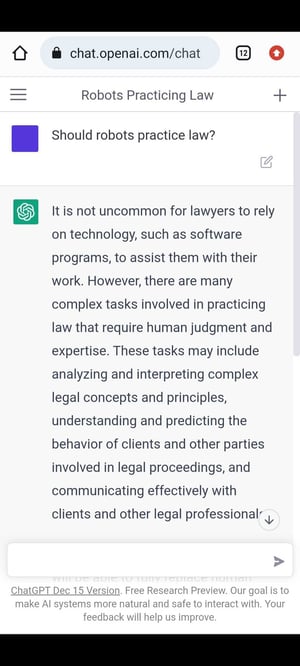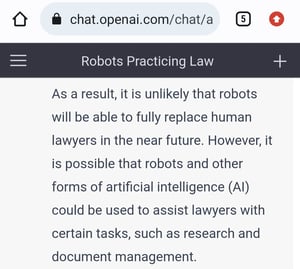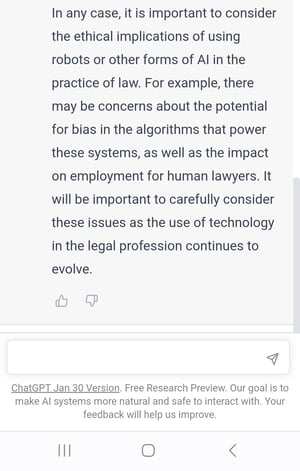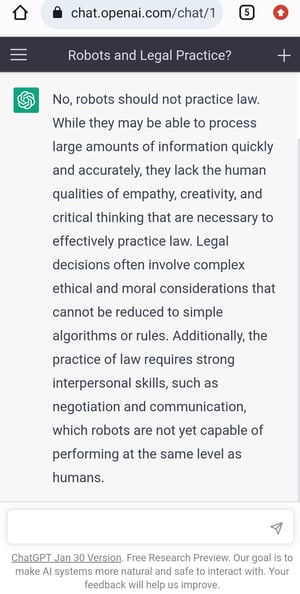There is much hype, excitement, and potential promise in the new AI Chatbot technology ChatGPT from OpenAI. What is it? Why is it so groundbreaking? How can it potentially be used with legal language? Should it be used to practice law? I decided to go straight to the horse's mouth for the answer, and below is the discussion that resulted.
What is ChatGPT?
Created by OpenAI, ChatGPT is an AI Engine that uses generative AI. Generative AI is a type of AI that uses algorithms to create or generate something new. With legal information, the output–or result–of the AI often involves text.
How is this different from non-generative AI? Non-generative AI algorithms often predict a result, but do not generate anything new.
Why is ChatGPT so groundbreaking?
ChatGPT uses generative AI algorithms to create something new based on a query or question from the end user. While the concept of a chatbot is not new, one that involves generating or creating entirely new and unique content is a novel iteration.
How can ChatGPT potentially be used with legal language?
There are endless possibilities, including legal research and writing, contract drafting and analysis, if simple and not complicated contracts are needed.
Should ChatGPT AI Engine (Robot) practice law?
I asked ChatGPT! You can see the output below. Interestingly, the AI Engine and I have similar views about whether robots should practice law.
In this exchange, ChatGPT discusses how “lawyers rely on technology” but then comments on how attorneys have unique skills, such as having “human judgment and expertise.” It then goes on to note these skills include areas such as “analyzing and interpreting complex legal concepts and principles.” It additionally gives examples having to do with this, such as “understanding and predicting the behavior of clients and parties.” It also notes the importance of communication between attorneys and clients as another factor. If the “robot” itself does not foresee AI engines practicing law because of numerous factors such as complexity and human relationships, a future with robot attorneys and judges seems more of a fable than a truth.
While AI engines are being trained to do some amazing things, when it comes to legal analysis and argument, they lack very important tools such as context and legal reasoning. Legal terms can also have different meanings depending on their usages and surrounding information, such as specific facts or even the jurisdiction. For a robot lawyer, not understanding advocacy and the views of different parties in a potential dispute is another conceivable issue. Most importantly, much of the law is based on the concept of “not yes or no, but maybe.” For a robot, the lack of black and white could be a huge barrier.
Law lives in the gray–there is often not one true answer, which is why there is litigation. This is an example of where AI Engines struggle. Remember, the law uses brilliant words such as “allegedly,” which would be a very complicated concept for an AI engine that cannot reason.
I believe current, and future attorneys can rest assured that they won’t be replaced by artificial intelligence. While I strongly believe that technology will increasingly become a part of legal practice, it will not replace our lawyers but rather enhance their day-to-day lives. Allegedly. 🙂
Output 1



Update: I asked the same question today and ended up with a more definitive answer from ChatGPT. It started with, “No, robots should not practice law.” And I agree. Though I personally found the original response more enlightening than the second.
Output 2



Subscribe to the LinkSquares Blog
Stay up to date on best practices for GCs and legal teams, current events, legal tech, and more.


%20-%20Copy%20of%20General_Header.png?width=575&name=Blog%20-%20Should%20Robots%20Practice%20Law%20(According%20to%20ChatGPT)%20-%20Copy%20of%20General_Header.png)